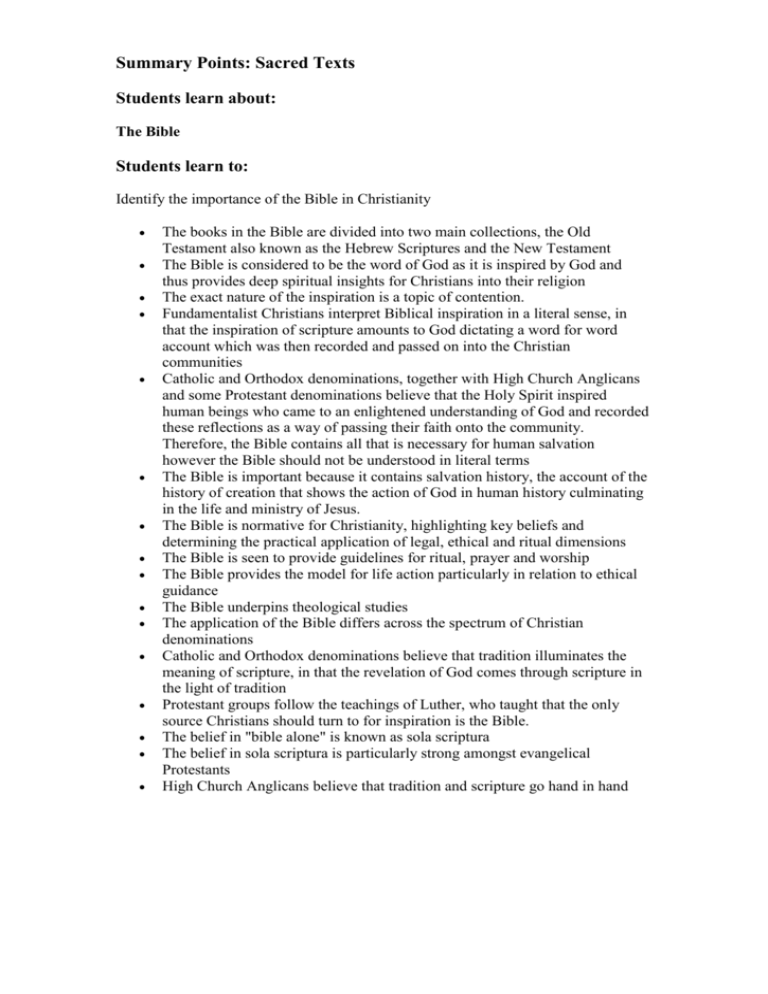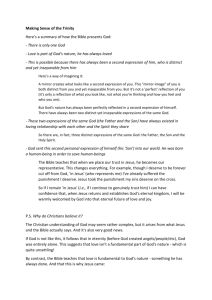Summary Points: Sacred Texts
advertisement

Summary Points: Sacred Texts Students learn about: The Bible Students learn to: Identify the importance of the Bible in Christianity The books in the Bible are divided into two main collections, the Old Testament also known as the Hebrew Scriptures and the New Testament The Bible is considered to be the word of God as it is inspired by God and thus provides deep spiritual insights for Christians into their religion The exact nature of the inspiration is a topic of contention. Fundamentalist Christians interpret Biblical inspiration in a literal sense, in that the inspiration of scripture amounts to God dictating a word for word account which was then recorded and passed on into the Christian communities Catholic and Orthodox denominations, together with High Church Anglicans and some Protestant denominations believe that the Holy Spirit inspired human beings who came to an enlightened understanding of God and recorded these reflections as a way of passing their faith onto the community. Therefore, the Bible contains all that is necessary for human salvation however the Bible should not be understood in literal terms The Bible is important because it contains salvation history, the account of the history of creation that shows the action of God in human history culminating in the life and ministry of Jesus. The Bible is normative for Christianity, highlighting key beliefs and determining the practical application of legal, ethical and ritual dimensions The Bible is seen to provide guidelines for ritual, prayer and worship The Bible provides the model for life action particularly in relation to ethical guidance The Bible underpins theological studies The application of the Bible differs across the spectrum of Christian denominations Catholic and Orthodox denominations believe that tradition illuminates the meaning of scripture, in that the revelation of God comes through scripture in the light of tradition Protestant groups follow the teachings of Luther, who taught that the only source Christians should turn to for inspiration is the Bible. The belief in "bible alone" is known as sola scriptura The belief in sola scriptura is particularly strong amongst evangelical Protestants High Church Anglicans believe that tradition and scripture go hand in hand \Students learn about: The Bible Students learn to: Examine extracts from the Bible which demonstrate the principal beliefs of Christianity The divinity and humanity of Jesus Christ o Matthew 16:13-20 - Jesus is the Son of God and therefore Jesus is fully divine o John 1:1-14 - Jesus is fully human as well as being co-eternal with the Father, in that he existed alongside God throughout all of eternity o Hebrews 4:14-16 - Jesus is fully human and is thus able to understand the exact nature of the human condition. Yet, he is also fully divine and thus able to intercede for human kind. In other words, he has both the power to save and the compassion to empathise with human need The nature of God and the Trinity o Luke 3:21-22 - Luke's description is testimony to the three persons of the trinity in relationship at the time of the baptism of Jesus o John 16:5-16 - This segment of Jesus' prayer focuses on the interrelationship between the three persons in the Trinity, especially the subsequent coming of the Spirit following Jesus' departure o John 5:1-12 - This passage speaks of the interrelationship between the three persons of the Trinity. Firstly, there is a close relationship between the believer through the Holy Spirit that flows from the Father and the Son and secondly the Holy Spirit gives testimony to the truth of Jesus Revelation o John 20:30-31 - The Scripture is recognised as a key vehicle of revelation, in reflecting the faith of the early Church community and inviting the audience to embrace the same faith o 2 Timothy 3:15-16 - The scriptures are a source of wisdom and lead us to have faith in Jesus who brings us the gift of salvation. Scripture is inspired by God o 2 Peter 1:20-21 - The Holy Spirit inspires people to write the Scriptures with the intent of encouraging faith and not necessarily to provide historical and scientific evidence of God Salvation o Matthew 25:26-31 - Eternal salvation is integrally connected to the treatment of others especially those who have the greatest need o John 3:16-17 - This verse highlights the fundamental Christian belief that salvation comes through Jesus o Rom 5:1-11 - Salvation comes through faith in Jesus, whose death reflects God's saving action and hence God's love of humankind









